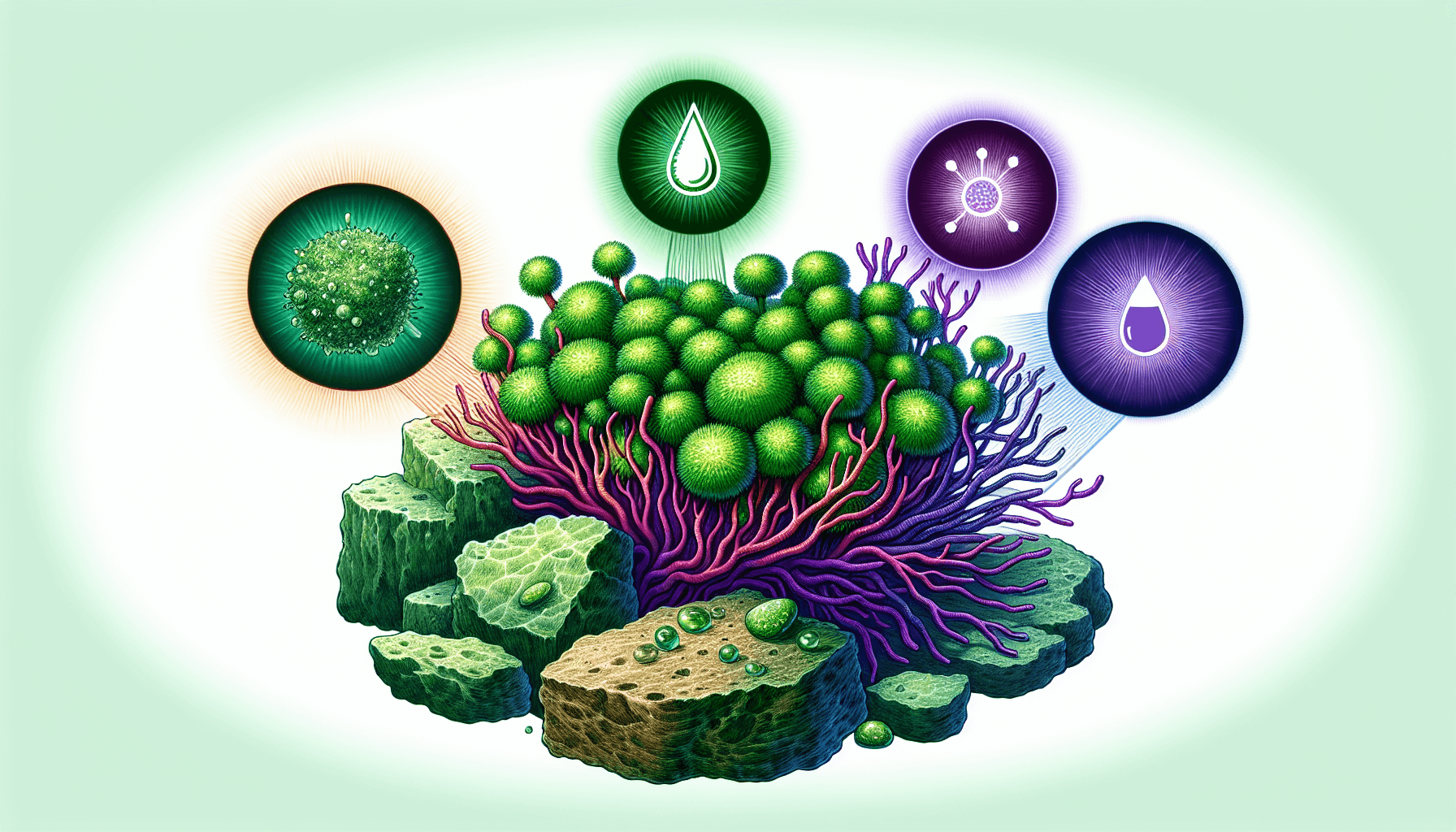* Only visible on admin mode.
Data Layer Value
Value
DataLayer - GTM_Page_Type
DataLayer - GTM_page_category

Content
Author
Reviewed by
Date
Category
Tags
Exploring Sea Moss: Top Health Benefits Revealed
Immunity, Lifestyle, Longevity


April 1, 2024
Sydney E.
If you’re wondering, “What is sea moss good for?” you’re in the right place. In general, it’s a nutritious food source that is loaded with essential nutrients that may support thyroid health, boost immunity, and aid with digestive well-being.
This guide breaks down the top benefits, examines the evidence, and suggests ways to include sea moss in your meals. Let’s dive in.
Key Takeaways
Key Takeaways
- Sea moss contains essential nutrients, including minerals (especially iodine), vitamins (like A, C, and E), and antioxidants (beta-carotene for one). It offers numerous health benefits, including immune support, healthy thyroid function, digestive health, and skin vitality.
- While sea moss has gained popularity as a potential superfood with promising health benefits, more extensive and rigorous human studies are needed to fully substantiate these claims.
- Sea moss consumption should be moderated and sourced from clean waters to avoid potential health risks like iodine overload and heavy metal exposure. Consult healthcare professionals before adding it to your diet.
Unlocking the Secrets of Sea Moss
Unlocking the Secrets of Sea Moss

Introduction
Introduction
Are you curious about what sea moss can do for your health? You've come to the right place! Sea moss is packed with important nutrients that can help keep your thyroid healthy, make your immune system stronger, and help your stomach digest food better.
In this article, we're going to talk about all the great things sea moss can do, look at what scientists say about it, and share some fun ways to eat sea moss. Let's get started!
Nutritional Profile of Sea Moss
Nutritional Profile of Sea Moss

Sea moss is rich in vitamins, minerals, and antioxidants, contributing substantially to daily nutritional requirements. But what exactly does sea moss bring to the table?
Let’s delve deeper into its nutritional profile.
A Treasure Trove of Essential Minerals
A Treasure Trove of Essential Minerals
One of the standout features of sea moss is its impressive mineral content. It’s a significant source of iodine, which is vital for thyroid health. But that’s not all. Sea moss is also rich in calcium and magnesium, essential minerals that play crucial roles in maintaining strong bones.
Moreover, sea moss is high in potassium, which supports proper nerve function and muscle contraction. This sea vegetable also provides electrolytes, which are essential for managing the body’s fluid balance.
Vitamins and Antioxidants Galore
Vitamins and Antioxidants Galore
Minerals aren’t the only nutritional gems in sea moss. It’s also abundant in various vitamins that are crucial for maintaining immune health and promoting skin vitality. This marine superfood provides a spectrum of vital nutrients, including vitamin A for skin health, vitamin B2 (riboflavin) to help with energy metabolism, vitamin B9 (folate) for DNA synthesis and repair, vitamin C to support the immune system, and vitamin E, which has antioxidant properties.
In addition to vitamin E, sea moss harbors other potent antioxidants, such as phycoerythrin and beta-carotene, which safeguard cells against the impacts of oxidative stress and support overall immune system health.
Taurine
Taurine
Sea moss is rich in the essential amino acid taurine, which helps with muscle recovery and may be particularly beneficial for vegetarians. Taurine also helps produce energy and balance fluids, salts, and minerals.
The Thyroid-Boosting Power of Sea Moss
The Thyroid-Boosting Power of Sea Moss
Sea moss is known to support thyroid health thanks to its high concentration and bioavailability of iodine. Iodine is a critical nutrient for the proper function of the thyroid gland and for the production of thyroid hormones, which regulate metabolism. Therefore, consuming sea moss could potentially support thyroid health.
However, it’s crucial to moderate the intake of sea moss due to its variable iodine content, which can lead to health issues if consumed in excess.
Because of the risk of too much iodine, consulting with healthcare professionals is essential before incorporating sea moss into a diet, particularly for those with existing thyroid disorders.
Gut Health and Sea Moss
Gut Health and Sea Moss
Sea moss may promote gut health through its bioactive compounds and prebiotic fiber, which support the growth of healthy gut bacteria.
The soluble fiber in sea moss can help increase short-chain fatty acids in the gut, which is vital for digestive health and provides a consistent nutrient supply for the digestive system.
Its mucilaginous consistency soothes the mucous membranes of the gut, which could benefit those with digestive disorders.
Preliminary research suggests that sea moss’s prebiotic qualities may influence weight management, further underscoring its potential benefits for gut health.
Heart Health and Sea Moss
Heart Health and Sea Moss

Sea moss may support heart health by maintaining healthy cholesterol levels and blood pressure.
Research suggests that sea moss may lower LDL (bad) cholesterol. Its bioactive components, such as carrageenan and minerals like potassium and magnesium, are associated with maintaining healthy blood pressure levels.
The potential benefits of sea moss include:
- Antihypertensive effects, which may contribute to better management of blood pressure levels.
- Protective benefits against conditions associated with elevated cholesterol.
- Potential as a heart-healthy addition to a balanced diet.
Weight Management and Sea Moss
Weight Management and Sea Moss
Sea moss may aid in weight management through its:
- Soluble fiber content: The soluble fiber in sea moss absorbs water to form a gel-like substance in the digestive tract, which can create a feeling of fullness, potentially aiding in weight management by slowing digestion and delaying stomach emptying.
- Fucoxanthin: This compound found in sea moss has been shown to have potential weight loss benefits by increasing metabolism and promoting fat burning. Fucoxanthin has also been studied for its potential to help control blood sugar and prevent diabetes
- Carrageenan: Found in red sea moss, carrageenan may enhance satiety due to its gelling ability.
These properties of sea moss make it a beneficial addition to a weight management plan.
Regular consumption of sea moss may improve digestion and reduce body fat when combined with a balanced diet and exercise. However, the current findings highlight the need for more human studies to fully understand the role of sea moss in weight management strategies.
Sea Moss and Immune Function
Sea Moss and Immune Function

Sea moss contains several vitamins and minerals that are critical for immune health, including vitamins A and C, iodine, zinc, and antioxidants. While these findings are promising, they underscore the need for more extensive research to confirm the potential immune system health benefits of sea moss supplements.
The Role of Sea Moss in Blood Sugar Management
The Role of Sea Moss in Blood Sugar Management
Sea moss may help manage blood sugar levels through its fucoxanthin and high fiber content.
The high fiber content of sea moss may contribute to blood sugar management by decelerating digestion, aiding in the controlled release of glucose into the bloodstream.
Clinical research indicates that seaweed supplementation, including sea moss, can have the following benefits for type 2 diabetes:
- Significantly reduce fasting blood glucose levels
- Lower postprandial glucose measurements
- Mitigate blood sugar spikes
- Support weight management in the context of a healthy diet
Potential Risks and Considerations When Consuming Sea Moss
Potential Risks and Considerations When Consuming Sea Moss
While sea moss is undoubtedly rich in nutrients, it’s important to be aware of potential risks associated with its consumption.
Due to variable iodine levels in sea moss, overconsumption may lead to iodine toxicity, which poses risks to thyroid health.
Depending on its source, sea moss may contain dangerous levels of heavy metals like lead and mercury, which can cause symptoms such as headaches and cognitive decline. High-quality sea moss sourced from clean waters minimizes the risk of exposure to harmful contaminants.
It’s crucial to consult with professionals when selecting safe, contaminant-free sea moss to avoid the risks associated with heavy metal contamination.
Creative Ways to Add Sea Moss to Your Diet
Creative Ways to Add Sea Moss to Your Diet

If you’re intrigued by sea moss and considering adding it to your diet, there are countless creative ways.
Sea moss gel can be effortlessly blended into juices or smoothies or mixed with water to enhance their nutritional value. However, some people find that it tastes like seawater or even clams or oysters. High-quality sea moss products may help alleviate this drawback.
Why not whip up a nutritious watermelon and sea moss smoothie for a refreshing drink? Blend watermelon, sea moss gel, honey, water, frozen strawberries, lime, and ice garnished with mint leaves for a delicious and healthful twist.
Sea moss can be added to savory meals, like soups and stews, where it acts as a thickening agent. It can also be used in salad dressings for extra nutrients.
A simple sea moss soup can be created by blending sea moss gel into a cooked leek and potato soup. It maintains its nutritional quality by avoiding prolonged exposure to high temperatures.
Or try enhancing a vegan Caesar salad dressing with sea moss by whisking hummus, mustard, lemon juice, capers, garlic, olive oil, maple syrup, and sea moss gel for a healthful twist.
There are many other delicious ways to consume sea moss. Here are some ideas:
- Strawberry & Banana Sea Moss Ice Cream: Can be made with frozen bananas, strawberries, sea moss gel, vanilla, cream, and condensed milk. This unites dessert enjoyment with the health benefits of sea moss.
- Seaweed Salad with Sea Moss: Combine various dry seaweeds, sesame seeds, and homemade dressing for a novel texture and elevated nutritional value.
- Sea Moss Guacamole Dip: Mash avocados with sea moss gel, onion, lime juice, garlic paste, cilantro, and spices for a denser, creamier, and more nourishing alternative to conventional guacamole.
The Importance of Consulting Health Care Professionals
The Importance of Consulting Health Care Professionals
Before you rush to add sea moss to your diet, it’s crucial to consult a physician or qualified health provider to weigh both its potential benefits and side effects.
Pregnant or breastfeeding women, as well as individuals on certain medications or with known allergies to iodine or seafood, should consult with a healthcare professional before using sea moss.
Summary
Summary
Sea moss, often hailed as a marine superfood, offers numerous potential health benefits, from supporting thyroid health to boosting the immune system to aiding in weight management.
Its impressive nutrient profile, including essential vitamins, minerals, and antioxidants, can contribute to overall health.
However, more research is needed to substantiate these claims, and it’s crucial to consult healthcare professionals before incorporating sea moss into your diet.
As we continue to explore this algae’s potential, one thing is clear: the sea may hold more secrets to our health than we ever imagined.
Frequently Asked Questions
Frequently Asked Questions
What does sea moss do to the body?
Sea moss may improve blood sugar control, help maintain healthy cholesterol levels, maintain inflammation levels, support thyroid function, and boost the immune system. These benefits contribute to overall health and may help lower the risk of common ailments.
Who shouldn't take sea moss?
Avoid taking sea moss if you have a thyroid disorder, a high heavy metal load, or are pregnant or breastfeeding. People with these conditions may experience unwanted side effects or complications if they consume sea moss. Additionally, if you are on blood thinners or have a shellfish allergy, you should also avoid taking sea moss.
It is important to consider these factors before incorporating sea moss into your diet or supplement routine.
What are the top benefits of sea moss?
What are the top benefits of sea moss?
Sea moss offers numerous benefits, including boosting the immune system, promoting healthy skin, reducing inflammation, supporting a healthy thyroid, cleansing the body, aiding in weight loss, boosting energy, and aiding muscle recovery. It can be a valuable addition to your diet.
Is it safe to take sea moss every day?
It’s generally safe to take sea moss daily, but it's essential to consult with your healthcare provider, especially if you have thyroid conditions, as it contains high levels of iodine.
The recommended intake is up to one serving or no more than 4 grams daily to avoid any adverse effects related to its high iodine content.
How can I add sea moss to my diet?
You can easily add sea moss to your diet by including it in smoothies, soups, salads, and desserts, which will boost your nutrients and health benefits. It is also available in supplement form as capsules and powders.


-
Latest Posts
-
-
The Power of Fiber: Why Your Body Loves It and How to Get More
-
Know Your Oats: A Comprehensive Guide
-
5 Steps to a Healthier You
-
Advancing Health with GLP-1: Innovations, Applications, and Future Directions
-
Understanding and Managing Urinary Tract Infections (UTIs): Prevention, Treatment, and Complications
-
-
Sign up now and receive
10% Off
Your Order
Cannot be combined with any other discount
By submitting your email address, you agree to receive marketing emails from Clinical Effects. We may use information collected about you on our site to suggest other products and offers. You can unsubscribe at any time. View Terms & Privacy
Thank you! Check your email for your discount
Contacts
Contacts
967 E. Parkcenter Blvd #345
Boise, ID 83706
7 A.M. - 3 P.M. MST, Mon - Fri
(833) 332-8655
support@clinicaleffects.com
THE STATEMENTS MADE ON OUR WEBSITES HAVE NOT BEEN EVALUATED BY THE FDA (U.S. FOOD & DRUG ADMINISTRATION). OUR PRODUCTS ARE NOT INTENDED TO DIAGNOSE, CURE OR PREVENT ANY DISEASE. CLINICAL EFFECTS IS NOT AFFILIATED WITH ANY OF THE STUDIES MENTIONED ON THE WEBSITE. THE TESTIMONIALS ON THIS WEBSITE ARE INDIVIDUAL CASES AND DO NOT GUARANTEE THAT YOU WILL GET THE SAME RESULTS.
© All Rights Reserved 2021






